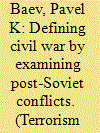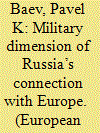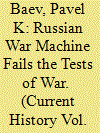|
|
|
Sort Order |
|
|
|
Items / Page
|
|
|
|
|
|
|
| Srl | Item |
| 1 |
ID:
077134


|
|
|
|
|
| Summary/Abstract |
Great many violent events happened during 1991-2005 in the 12 states that emerged after the collapse of the USSR but only a few civil wars are registered in the major datasets. That brings up a number of questions about the operational definitions of civil war that generally point in the direction of shifting the research attention from refining the quantitative parameters to grasping the essense of the phenomena in question. It is proposed that civil war partially overlaps with several other type of violent crisis: inter-state wars, civil unrest and revolutions, internal repression, military coups and mutinies, banditry and organized crime, and terrorism. These overlaps create six 'gray zones' where only very nuanced examination rather than application of rigid criteria could help in distinguishing civil wars from other crises. Therefore, data collection based on a single "robust" definition, which incorporates several verifiable parameters, is not necessarily the only path to scientific knowledge about civil wars
|
|
|
|
|
|
|
|
|
|
|
|
|
|
|
|
| 2 |
ID:
158114


|
|
|
|
|
| Summary/Abstract |
The Russian challenge to the European security system is internal rather than external, because despite all the political efforts at distancing Russia from Europe, the indivisibility remains undiminished. The underlying assumption for Russia’s course is that the West is in irreversible decline, and the conclusion about the dissolution of the West-controlled world order is established in the key doctrinal documents. Instead of passively waiting for this meltdown to develop, it makes perfect sense for the Russian leadership to accelerate it pro-actively, using various levers, including military force. Moscow acts on the assumption that its “unconventional” methods could yield results only if augmented by military threats, against which the Europeans cannot master convincing counter-argument. The imperative to sustain and update credibility of these threats necessitates allocation of greater share of available resources to military build-up, which clashes with economic rationale of reducing this burden in the situation of protracted stagnation.
|
|
|
|
|
|
|
|
|
|
|
|
|
|
|
|
| 3 |
ID:
099651


|
|
|
|
|
| Publication |
2010.
|
| Summary/Abstract |
The energy sector since the mid-2000s has acquired top priority in Russian state affairs, but since late 2008 it has also become the epicentre of the economic disaster that still continues to affect Russia. President Medvedev has effectively discarded the notion of Russia as an 'energy super-power' and is now focusing on 'modernisation' for Russia's development. But coherence of this course is problematic because the bulk of new investments must go into the energy sector in order to sustain the high revenues. The main flow of these revenues comes from Europe, but Gazprom's position in this market is now seriously undermined.
|
|
|
|
|
|
|
|
|
|
|
|
|
|
|
|
| 4 |
ID:
139612


|
|
|
|
|
| Summary/Abstract |
The severe and fast-evolving Ukraine crisis has required a great concentration of Russia’s political efforts and is having a massive impact on Russian policymaking, including in the Middle East. This region provides the best opportunity for Moscow to reassert its status as a key player in the global arena, and the deep fall of oil prices makes Russia particularly attentive to regional conflict developments. One of the main motivations for Russia is the pronounced desire to demonstrate its capacity to thwart US policy, but another is to prove its value to China as a strategic partner. Russia’s reach remains limited but it will continue to look for opportunities to make a difference.
|
|
|
|
|
|
|
|
|
|
|
|
|
|
|
|
| 5 |
ID:
079603


|
|
|
|
|
| Publication |
2007.
|
| Summary/Abstract |
Russia's evolving 'energy ideology' and its approach to defining its role in the global energy markets with the particular focus on the interests in and intentions for Asia have drawn considerable attention. Russia's claim for the role of 'global energy security provider', advanced with much aplomb in the context of the G8 chairmanship, is, however, undermined by the stagnation in the oil and gas production and increasing shortages of electricity. Given Russia's increasing unreliability as the key supplier, its claim for the status of 'energy superpower' has shrivelled like a punctured balloon. The article, in particular, analyses the developments, problems and prospects in the three key sectors - oil, gas and nuclear energy - and argues that Russia's 'energy ideology' remains raw and inconsistent and has only helped contribute to the global 'energy insecurity'
|
|
|
|
|
|
|
|
|
|
|
|
|
|
|
|
| 6 |
ID:
125346


|
|
|
|
|
| Publication |
2013.
|
| Summary/Abstract |
[P]olicies based on the delusional but popular perception of the Arctic shelf as a 'treasure chest' of high-value resources that must be protected by military means have arrived at an inevitable dead end.
|
|
|
|
|
|
|
|
|
|
|
|
|
|
|
|
| 7 |
ID:
193460


|
|
|
|
|
| Summary/Abstract |
The Russian military has failed the tests of the Ukraine war, and its leadership and chain of command are seriously compromised. A costly modernization program failed to deliver the promised superiority in key weapon systems, offensive capabilities are exhausted, and the quality of manpower has deteriorated. The ill-fated reliance on the Wagner Group was a result of this degradation. Nuclear weapons cannot be used to break the pattern of slow-moving defeat, and the resource base for sustaining the long war is being depleted. In the medium term, Russia cannot count on rehabilitating its capacity for threatening its neighbors.
|
|
|
|
|
|
|
|
|
|
|
|
|
|
|
|
| 8 |
ID:
144440


|
|
|
|
|
| Summary/Abstract |
High-level declarations in Moscow and Beijing on the steady progress in upgrading their strategic partnership depart increasingly far from the reality of shrinking economic ties and diverging political perspectives. In late 2014, the dynamic development of this partnership appeared to have the potential of becoming a major shift in the fluid security balance in the Asia-Pacific region; in late 2015, however, the concerned neighbours have more reasons to worry about the deformations in the development of Russia–China relations. President Vladimir Putin and President Xi Jinping are eager to demonstrate perfect personal rapport but their mutual trust is open to doubt and their views on priorities of domestic and international order are in fact strikingly dissimilar. The deep contraction of trade and the lack of interest from Chinese investors propels the Russian leadership towards increasing the emphasis on the security dimension of the partnership, and this makes Russia one of the key sources of instability in the Asia-Pacific region and a challenge to the East Asian peace. It is also entirely possible that the Russian challenge to the stability of the world system would result in strengthening of the key institutions of its governance, thus leaving the revisionist Russia in isolation.
|
|
|
|
|
|
|
|
|
|
|
|
|
|
|
|
| 9 |
ID:
099559


|
|
|
|
|
| Publication |
2010.
|
| Summary/Abstract |
The plan for the southern energy corridor delivering a new secure supply of natural gas to the European Union is shaped by projects for two pipelines-Nabucco and the South Stream. Economic rationales for both projects are far from solid as the prospects for returns on massive investments are doubtful due to uncertainty about demand. Much political effort has nevertheless been expended on advancing these competing 'mega-projects', which have acquired symbolic status in different approaches to securitization of energy matters. The continuing recession has not added much weight to common economic sense, which dictates that the most efficient way to bring Russian and Caspian gas to Europe is modernization and joint management of Ukrainian gas infrastructure. Parallel construction of both pipelines remains the most probable outcome of their 'race', while simultaneous cancellation could have saved resources and political faces.
|
|
|
|
|
|
|
|
|
|
|
|
|
|
|
|
| 10 |
ID:
126101


|
|
|
|
|
| Publication |
2013.
|
| Summary/Abstract |
It was the privately-sponsored Russian expedition to the North Pole in August 2007 that opened a new competitive era in Arctic geopolitics, and the technologically elegant PR-trick with planting the flag into the crisscross point of meridians on the depth of 4,261 m produced a resonance that distorted strategic thinking about, and political interactions in the Arctic region. Six years later, the dust of over-excited forecasts of unregulated confrontation across the Northern frontier has mostly settled down and the atmosphere of cooperation has become prevalent, but Russian Arctic policy is in new disarray. With its large population centres (like Murmansk or Norilsk) beyond the Polar circle and huge resource-extraction industry, Russia is objectively the Arctic superpower, and the high concentration of strategic forces on the Kola Peninsula adds a heavy military dimension to this status, but Moscow is nervous about protecting its interests against encroachments of ambiguous neighbours and ambitious newcomers. 1 The discourse of 'conquering' and 'owning' the High North is organic to the Russian state identity, incoherent as it is, and is often exploited as political expediency dictates, which increases the sensitivity of public opinion to setbacks and accidents that tend to bedevil many Arctic projects. There is a rich tradition of exploring and developing the vast inhospitable territories and seas, but the attention to environmental issues and to the rights of indigenous peoples is strikingly low. This article focuses on the crucial importance of issues pertaining to sovereignty in Russian policy-making, while starting with examining the revised evaluations of Arctic resources and continuing with assessing the usefulness of military build-up.
|
|
|
|
|
|
|
|
|
|
|
|
|
|
|
|
| 11 |
ID:
151993


|
|
|
|
|
| Summary/Abstract |
The article discusses if China will be inspired by its strategic partner Russia to use force as an instrument of its foreign policy. After a pro et con discussion the authors find that the disincentives created by the Russian example are likely to convince China that it should continue to show restraint under the ‘peaceful development’ formula, and avoid military adventures. The East Asian Peace is thus not seriously threatened, at least not by China—for now.
|
|
|
|
|
|
|
|
|
|
|
|
|
|
|
|
| 12 |
ID:
164266


|
|
|
|
|
| Summary/Abstract |
Russia’s Arctic policy keeps going along two poorly compatible tracks of expanding military activities and committing to international cooperation. Exaggerated threat assessments are typically advanced to justify the strongly set strategic priority for sustaining investments in building up the military capabilities, including nuclear forces. The option for developing cooperation has become unprofitable due to the sanctions regime, but its main downside is that it denies Russia the opportunity to exploit the perceived and highly valued position of power it holds in the Barents region. Russia has the capabilities and can create opportunities for forceful proactive advances in the High North, and caution is not a behavior pattern that can be expected from an essentially authoritarian regime that is threatened by domestic discontent and external pressure.
|
|
|
|
|
|
|
|
|
|
|
|
|
|
|
|
| 13 |
ID:
150336


|
|
|
|
|
| Summary/Abstract |
“Moscow may not be very good at learning lessons from setbacks, and certainly tends to exaggerate its successes, but it has few doubts about the feasibility of ‘military solutions’ and
even fewer reservations about reaching for them.”
|
|
|
|
|
|
|
|
|
|
|
|
|
|
|
|
|
|
|
|
|